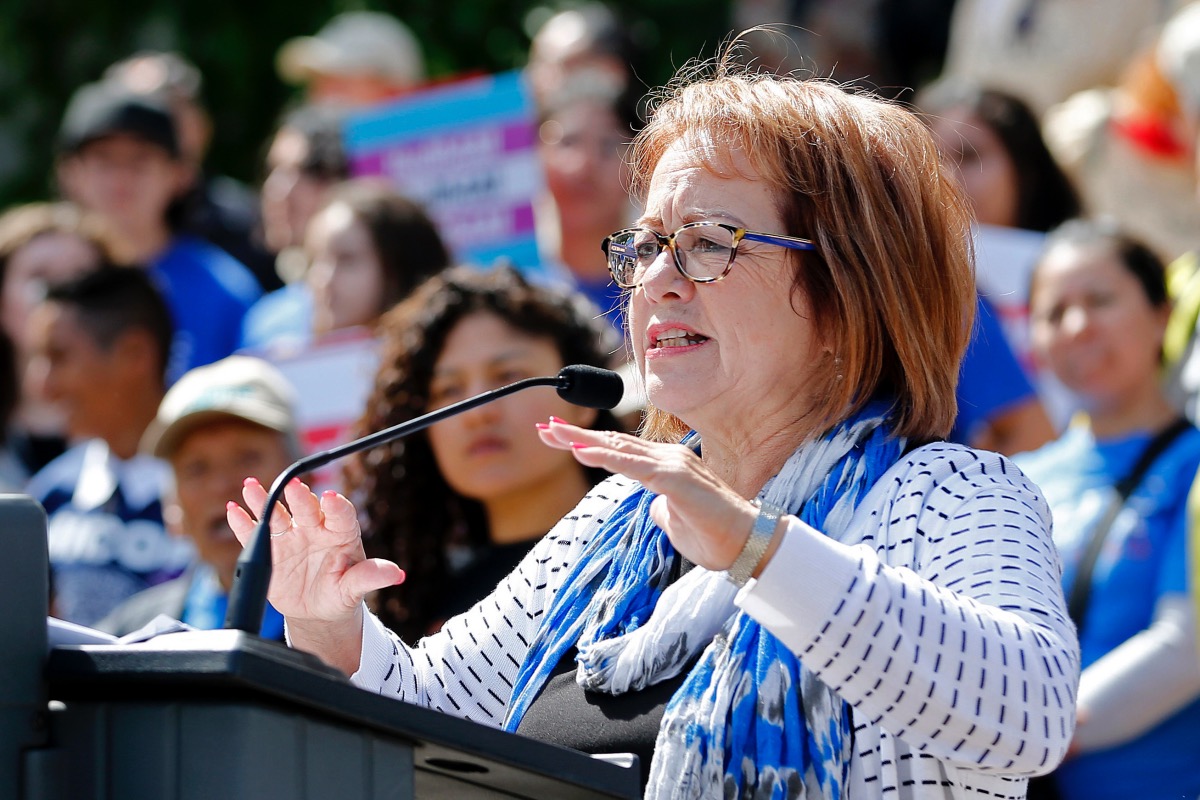

California state Sen. María Elena Durazo, D-Los Angeles, addresses a gathering in Sacramento, California, on May 20, 2019. Domestic workers in California don’t have the same safety protections required by law for many employees in case they get injured or sick on the job. But state lawmakers are trying to change that in their latest attempt to expand these workers’ rights in a bill introduced by Sen. Durazo. (AP Photo/Rich Pedroncelli)
Martha Herrera could hardly contain her excitement as she stood outside the California State Assembly in Sacramento on Wednesday.
When news broke that SB686, a bill meant to ensure safer working conditions for domestic workers, had advanced out of the Committee on Labor and Employment, she and other domestic workers nearly lifted and paraded the bill’s sponsor, Sen. María Elena Durazo (D), around out of sheer joy.
The bill was passed onto the Appropriations Committee with a unanimous vote.
“For domestic workers, we are seeing the fruits of a struggle of many years,” Herrera said.
Currently, domestic workers and day laborers are excluded from California’s workplace health and safety protections under the California Division of Occupational Safety and Health (Cal/OSHA).
The state employs more than 300,000 domestic workers, primarily immigrant women. In 2018, three-quarters of domestic workers in California were Latino, according to the UCLA Labor Center.
The bill comes at a time when domestic workers continue to mobilize across the country for better pay, guaranteed safety protections, and workplace benefits. Just this year, President Joe Biden issued an executive order recognizing the labor rights of domestic workers at the federal level.
“We have a unique opportunity to make a historical shift and change,” Kimberly Alvarenga, director of the California Domestic Workers Coalition, told Latino Rebels by phone.
Sen. Durazo, whose 26th district includes East Los Angeles, also expressed that, for too long, domestic workers’ rights have been marginalized.
“In the absence of OSHA protections, California is leaving its care economy, the women/people that take care of us, vulnerable to exploitation, isolation, and life-threatening workplace conditions,” she said in an email.
Domestic Work with Dignity
In California, the road to full work safety protection has been a long one—solely driven by grassroots efforts, as highlighted by the PBS documentary Dignidad Domestic Workers’ Journey for Justice in California.
An earlier bill, SB1257 —or the “Health and Safety for All Workers Act”— was passed by the California State Assembly to extend Cal/OSHA protections to domestic workers.
Working on the front lines of the COVID-19 pandemic, countless laborers were exposed daily to cleaning chemicals, ergonomic injuries, and the virus itself. California also experienced a number of wildfires at the time, with many immigrant and Latina nannies putting their lives at risk to take care of their employers’ homes, as highlighted by a November 2019 column in the Los Angeles Times.
The act was vetoed by Gov. Gavin Newsom, citing privacy concerns.
Another bill, SB321, was then introduced in 2021 with the same goal extending of health and safety guarantees. However, it had to be amended after Gov. Newsom cited the same concerns. The proposed amendment required the exclusion of domestic workers from OSHA laws and the creation of an advisory committee to produce voluntary guidelines for domestic worker safety.
In 2022, the nannies, house cleaners, organizers, and caregivers got to work once again. A policy report released by the coalition listed as its top recommendation the re-inclusion of household domestic services under Cal-OSHA.
Now, with SB686, health and safety guidelines for domestic workers would be mandatory. The bill would also create a fund to help low-income employers make their homes safer workplaces, as well as expand the existing Domestic Worker and Employer Outreach and Education Program.
Martha’s Story
Martha Herrera first arrived in the United States from Zacatecas, Mexico 25 years ago and began working as a house cleaner and nanny.
She says one particular situation with a family had a lasting impact on her career and how she perceived her rights. At the time, she had been caring for a young girl with special needs since the girl was four years old. By the time the girl reached eight, she depended solely on Herrera for feeding and dressing.
Herrera recalls one occasion in which she was helping the girl bathe when the girl slipped, leading Herrera to reflexively try to support the girl before she fell completely. The next day Herrera felt excruciating pain in her back and waist and couldn’t bring herself to stand up.
When she went to the family with her injury, they let her go with $300, saying there was nothing they could do to help.
It took three months for Martha to recover from her injuries, but she carries frustration and sadness that came with being let go to this day.
“I would give everything to that girl, to that family,” Herrera said. “They (her employers) just washed their hands of us and threw us out as if we didn’t have any value.”
Realizing she needed a space to feel supported, she became involved in Mujeres Unidas y Activas, a membership-based immigrant community organizing and leadership development program in San Francisco where she felt she found her voice. Since then, Herrera has become a passionate organizer on the issue of domestic workers’ rights.
With SB686, she says that she can point to these guaranteed protections to future employers to ensure her health and safety while on the job.
“If we achieve this, it’s huge,” Herrera said. “Because if we get hurt, we now have someone who will look out for us.”
***
Mariana Martínez Barba is a summer correspondent at Futuro Media and is currently studying at the Craig Newmark Graduate School of Journalism at the City University of New York. Twitter: @marianamtzbarba



this would just make me hire as few domestics or cleaning ladies as possible.
safety of course. but higher wages would just make people clean their home themselves.
[…] California Committee Passes Bill for Domestic Workers’ Rights […]